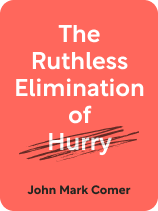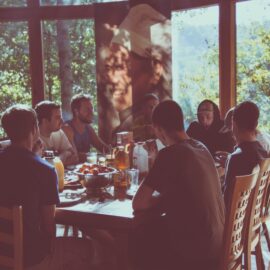

This article is an excerpt from the Shortform book guide to "The Ruthless Elimination of Hurry" by John Mark Comer. Shortform has the world's best summaries and analyses of books you should be reading.
Like this article? Sign up for a free trial here.
Do you get invited to things that don’t add to your life in a meaningful way? Would you like to protect the life you’ve worked hard to create?
In The Ruthless Elimination of Hurry, pastor John Mark Comer explores our cultural obsession with rushing and how it’s harmful. He shares insights on how to stop rushing through a hectic life. Then, he advises you to set boundaries and turn down opportunities that would interfere with your new lifestyle.
Continue reading to learn how to say no to an invitation when it comes your way and keep your unhurried life intact.
How to Say No to an Invitation
Comer argues that you can escape the culture of rushing by following the lifestyle of Jesus who wasted no time but enjoyed a healthy pace. Then, he shows you how to maintain these habits as new obligations and opportunities threaten to make your days more rushed or encroach on your spiritual practice.
Comer insists that you must protect your lively lifestyle by regularly turning down opportunities that you don’t have the time or the capacity for. When you learn how to say no to an invitation, you can use that time to focus on things that really matter—your health, relationships, connection to God, and life purpose.
For inspiration on turning down opportunities, look to Jesus. According to Comer, Jesus set boundaries to prevent additional obligations from making his lifestyle rushed. For instance, he refused several invitations to preach when those opportunities conflicted with his scheduled prayer time.
(Shortform note: By refusing invitations to preach so he could pray, Jesus opted to commit to one spiritual activity fully, instead of packing his schedule with multiple spiritual activities. This example of boundary-setting may be particularly useful for Christians and church leaders who tend to overcommit to spiritual endeavors. In An Unhurried Life, pastor Alan Fadling explains that Christians today tend to see their ability to pack their schedules with worship-related activities as a testament to their faithfulness. Fadling advises Christians to remember that God appreciates the devotion behind their many worship-related activities, but prefers it when they’re engaged in a slower, more intentional connection with him—as Jesus did.)
| Tips for Turning Down Opportunities It can be challenging to turn down opportunities, especially ones that sound fun and meaningful. In Essentialism, Greg McKeown offers several tips for saying “no” to new opportunities: Consider opportunity costs. It’s easier to say “no” when you identify what you’d miss out on by saying “yes.” For instance, say your friend invites you to take a surfing class with them—but each session would require a two-hour commute to and from the beach. Think about what you could do instead of driving, like attending church or playing with your kids. Separate people from their requests. When someone asks you to do something for or with them, you may worry that saying “no” will make them feel rejected. Remember that the person making the request is more than their request—you can say “no” and maintain your close connection to them. For instance, tell your friend, “I can’t commit to the class because the commute is too long, but let’s still plan to get together weekly somewhere closer to home.” |

———End of Preview———
Like what you just read? Read the rest of the world's best book summary and analysis of John Mark Comer's "The Ruthless Elimination of Hurry" at Shortform.
Here's what you'll find in our full The Ruthless Elimination of Hurry summary:
- Our cultural obsession with rushing and how it's harmful in many ways
- How to stop rushing by deepening your Christian spiritual practice
- How to carve out more time for your spiritual practice






